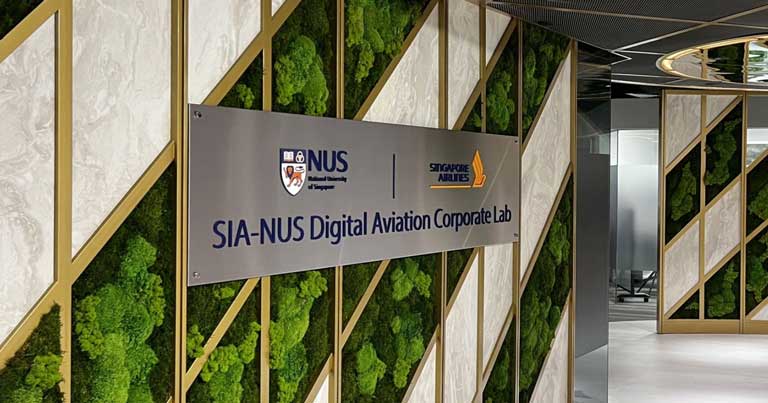
Singapore Airlines (SIA) and the National University of Singapore (NUS) have launched a new digital aviation corporate laboratory, which will co-create innovative technologies and solutions that would accelerate the digital transformation of Singapore’s aviation sector, and help redefine the air travel experience for passengers.
The SIA-NUS Digital Aviation Corporate Laboratory was officially launched by Heng Swee Keat, Deputy Prime Minister, Coordinating Minister for Economic Policies and Chairman of the National Research Foundation Singapore (NRF). Situated at the Innovation 4.0 Building at NUS Kent Ridge campus, the S$45 million research facility is jointly set up by SIA and NUS and supported by the NRF. This is the seventh corporate laboratory to be established at the University, which is also the 19th in Singapore.
The Corporate Laboratory is the result of a robust partnership between NUS and SIA. The airline launched its Digital Innovation Blueprint in 2018 to establish itself as a digital aviation and travel experience leader. This was followed by the signing of two Memoranda of Understanding (MoUs) between NUS and SIA, with the university as the airline’s knowledge partner.
NUS President Professor Tan Eng Chye said: “This significant collaboration will tap into NUS’ deep-tech and multi-disciplinary research expertise across artificial intelligence (AI), machine learning, data science, operations research and analytics, optimisation, sleep studies and industrial design, to deliver high value and productivity improvements for SIA, our country’s flagship carrier. The innovative technologies developed from the research will redefine the air travel experience for passengers worldwide, while accelerating the digital transformation of Singapore’s aviation sector.”
Singapore Airlines Chief Executive Officer Goh Choon Phong said: “By bringing together NUS’ wealth of research expertise and SIA’s knowledge and experience in the aviation sector, this Corporate Laboratory will strengthen our position at the forefront of digital innovation in the airline industry. It will lead to even more innovative solutions that can enhance the customer experience and travel journey, optimise revenue generation, and increase operational efficiency. Our collaboration with NUS will also reinforce Singapore’s position as a global aviation hub, with world-class research and cutting-edge technologies at the heart of our future development.”
The SIA-NUS Digital Aviation Corporate Laboratory is helmed by Professor Teo Chung Piaw, Executive Director of the Institute of Operations Research and Analytics of NUS, and Chan Mun Chung, Senior Manager at SIA’s Digital Innovation Lab, who will be the co-Directors of the Corporate Laboratory. The objectives of the Corporate Laboratory are to drive traveller-centric digital services, ensure security and safety in air travel, and enhance organisational effectiveness and workplace productivity for SIA and Singapore’s aviation sector.
Featuring state-of-the-art equipment and facilities, such as a cabin simulator and a cockpit simulator with Augmented Reality (AR) and Virtual Reality (VR) technologies, the Corporate Laboratory will leverage NUS’ wide and deep research expertise across its faculties and research institutes to embark on research activities in the following areas:
- Revenue Management and Dynamic Pricing: Developing better techniques by using data-driven methods in demand-modelling, fare pricing and seat allocation to enhance operational efficiencies.
- Transforming Competency and Skill Development: Developing intelligent and quantified pilot and cabin crew training methods, leveraging eye tracking, AR and VR, as well as post-flight feedback technologies to encourage employees to embrace continuous learning through training.
- Employee Wellness: Developing intelligent fatigue and alertness models using wearables to improve and enhance safety, performance, and productivity.
- Passenger Comfort, Sleep and Cabin Service: Developing real environment cabin simulators to enhance customers’ comfort, sleep qualities, as well as developing specifications of new product and service protocols for enhanced and unparalleled customer service.






